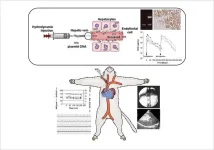(Press-News.org) Researchers from the University of Cambridge and the Dublin Institute for Advanced Studies have discovered that variations in the thickness of tectonic plates relate directly to the distribution of earthquakes in Britain, Ireland and around the world.
The study also solves an enduring mystery as to why small earthquakes happen frequently in Britain but are almost completely absent from neighbouring Ireland.
The researchers produced a computer-generated image of Earth’s interior using a technique called seismic tomography, which works in a similar way to a medical CT scan. The data they collected revealed variations in the thickness of the solid outer part of Earth, also known as the lithosphere, across Ireland and Britain.
“Earthquake locations are surprisingly uneven across Britain and Ireland,” said Sergei Lebedev, lead author of the research Cambridge’s Department of Earth Sciences. “We can now explain this disparity, which has puzzled scientists for over a century.”
The researchers found that the lithosphere is thin and weak beneath western Britain, meaning that the rocks can bend easily — triggering earthquakes across this region. In contrast, Ireland sits on top of thick and strong lithosphere, explaining the lack of earthquakes.
Even though the UK is located far from the nearest plate boundary, where most earthquakes happen across the world, minor tremors still a relatively common occurrence. According to the BGS, the UK is rattled by between 200 and 300 small to moderately-sized tremors every year, mostly occurring along the western side of mainland Britain. Less than 30 out of these earthquakes are strong enough to be felt, although on rare occasions they can cause more damage.
Earthquakes in the UK don’t reach the magnitude seen in other parts of the world, said Lebedev, “But we still need to understand why they happen where they do so that engineering projects can consider seismic hazards.”
Although small earthquakes are fairly common in western Britain, adjacent Ireland is almost completely free of seismic activity. That contrast was first noticed by Irish seismologist Joseph O’Reilly who, back in 1884, mapped out the location of historic earthquakes across Britain and Ireland.
Ever since, scientists have been trying to understand why earthquakes happen in Britain but not in Ireland. One theory is that the earthquakes might be concentrated in localised areas of land that are shifting more than others after the ice sheets that covered Britain melted about 12,000 years ago. But this, and other theories, “Don’t fully explain the location of seismic activity we see,” said Lebedev.
The researchers deployed a network of seismometers across Ireland, meaning they could measure how seismic waves released by earthquakes travelled through Earth and get a detailed look at the crust below.
They found that the distribution of earthquakes across Britain and Ireland closely matched the thickness and strength of the tectonic plate below. “The properties of the lithosphere are clearly controlling the location of earthquakes. We didn’t expect that link to be quite so striking,” said Lebedev.
In Ireland, the researchers found that the lithosphere was stronger and thicker than beneath the more seismically active parts of western Britain. That added strength means the tectonic plate doesn’t buckle, “It deforms easily in this area, resulting in fewer earthquakes in Ireland,” said Lebedev.
“The thin, weak lithosphere running down the length of western Britain clearly explains why it experiences more earthquakes,” said Lebedev. That difference means the tectonic plate can crumple and break, activating ancient faults near the surface and causing tremors.
The team’s results also help explain more localized patterns in earthquake locations in Britain and Ireland. For instance, the one location in Ireland where earthquakes do occur— in Co. Donegal — sits on top of a blob of weak lithosphere. In Britain, there are patches of stronger tectonic plate beneath eastern Scotland and south-eastern England where fewer quakes happen.
Commenting on the discovery, Professor Chris Bean, from the Dublin Institute for Advanced Studies said, “These research findings are highly significant as they show that even within the same plate, local details are important. We now have the reasoning behind why more earthquakes are occurring in Britain than in Ireland, and new insight into where the likelihood of occurrence is higher.”
Aside from understanding the puzzling distribution of earthquakes in Britain and Ireland, the results also help understand the forces shaping earthquake distributions in the middle of other tectonic plates. The researchers now plan on investigating earthquakes in Africa and other continents, which also seem to be concentrated in areas where the lithosphere is thinner and mechanically weaker.
END
Why earthquakes happen more frequently in Britain than Ireland
2023-06-08
ELSE PRESS RELEASES FROM THIS DATE:
Greenhouse gas emissions at ‘an all-time high’ - and it is causing an unprecedented rate of global warming, say scientists
2023-06-08
University of Leeds Press Release
Under embargo until 09.00 am (British Summer Time) on Thursday, June 8
**With details of a linked press conference at the UNFCC meeting in Bonn - see under notes to journalists**
Greenhouse gas emissions at ‘an all-time high’ - and it is causing an unprecedented rate of global warming, say scientists
Human-induced ...
Birmingham spinout to develop 20-minute test following surge in sexually transmitted infections
2023-06-08
University of Birmingham spinout Linear Diagnostics has received funding to finesse a point-of-care test for rapid diagnosis of gonorrhoea and Chlamydia in men who have sex with men (MSM), and women who have sex with women (WSW).
The funding from the National Institute of Health and Social Care Research (NIHR) will cover essential work to optimise and validate Linear’s platform technology (LDx-CTNG), so it can diagnose infection from rectal and pharyngeal (throat) swabs.
Gonorrhoea and Chlamydia are both major public health concerns. While Chlamydia remains the most commonly detected sexually ...
Study finds socially tolerant monkeys have better impulse control
2023-06-08
Researchers have tested one of the ideas put forward to explain how humanity evolved to become smarter, on non-human primates.
The study, led by a team at the University of Portsmouth, found a significant connection between social organisation and cognitive skills in monkeys.
They assessed three species of macaques with different social tolerance levels, from authoritarian to more relaxed societies, in a series of cognitive touchscreen touchscreen tasks to work out how impulsive and reactive ...
Shirley Ryan AbilityLab receives $8.7 Million NIH grant for first-of-its-kind bionic arm osseointegration study
2023-06-08
Today, an estimated 41,000 people in the United States live with the loss of an upper limb, including hundreds of service men and women. Although significant progress has been made in the durability, control and function of upper-limb prosthetic devices, they lack complete integration into the body and, importantly, do not enable their users to feel.
Now, with the award of an $8.7 million grant from the National Institutes of Health (NIH), Shirley Ryan AbilityLab — the top-ranked physical medicine and rehabilitation hospital — and its research partners have an opportunity ...
Bath Professor given international award recognizing lifetime research achievements
2023-06-08
Professor Laurence Hurst, Director of the Milner Centre for Evolution at the University of Bath, has been recognised for his world-leading research into genetics and evolution with a prestigious Humboldt Prize.
The Humboldt Prize, also known as the Humboldt Research Award, is an award given by the Alexander von Humboldt Foundation of Germany to internationally renowned scientists and scholars who work outside of Germany in recognition of their lifetime's research achievements.
Named after the Prussian naturalist and explorer Alexander von Humboldt, recipients of the prize are academics whose “fundamental discoveries, new ...
Employers should think twice before implementing peer recognition programs
2023-06-08
In fast-paced and often rapidly changing work environments, employers continue to seek new and improved ways to recognize employees in the workplace. However, new research from the University of Waterloo suggests that public peer recognition may backfire by enabling comparisons among employees, and these comparisons may make some employees feel unfairly treated.
“Employers have sought out various peer recognition systems in an effort to promote employee helping behaviour,” said Pei Wang, PhD ...
A new way to develop drugs without side effects
2023-06-08
Have you ever wondered how drugs reach their targets and achieve their function within our bodies? If a drug molecule or a ligand is a message, an inbox is typically a receptor in the cell membrane. One such receptor involved in relaying molecular signals is a G protein-coupled receptor (GPCR). About one-third of existing drugs work by controlling the activation of this protein. Japanese researchers now reveal a new way of activating GPCR by triggering shape changes in the intracellular region of the receptor. This new process can help researchers design drugs with fewer or no side effects.
If the ...
Liver lobe-specific hydrodynamic gene delivery to baboons: A preclinical trial for hemophilia gene therapy
2023-06-08
Niigata, Japan - The research group of Professor Kamimura in Niigata University have applied the novel, liver lobe-specific hydrodynamic delivery procedure to primates (baboons) for the first time. “Delivery of a plasmid that expresses a therapeutic gene for human hemophilia achieved therapeutic levels of human factor IX gene expression lasting for 200 days after the delivery of a plasmid”, says Prof. Kamimura. In addition, the results demonstrated the efficacy of repeated hydrodynamic gene delivery into the same liver lobes. Furthermore, no plasmid was introduced into organs other than the livers ...
One-month of COVID-19 lockdown cost heart attack patients up to two years of life
2023-06-08
Sophia Antipolis, 8 June 2023: Patients who had heart attacks during the first COVID-19 lockdown in the UK and Spain are predicted to live 1.5 and 2 years less, respectively, than their pre-COVID counterparts. That’s the finding of a study published today in European Heart Journal – Quality of Care and Clinical Outcomes, a journal of the European Society of Cardiology (ESC).1 The additional costs to the UK and Spanish economies are estimated at £36.6 million (€41.3 million) and €88.6 million, respectively, largely due to absence from work.
“Restrictions to treatment of life-threatening conditions have immediate and long-term ...
Long Covid can impact fatigue and quality of life worse than some cancers
2023-06-08
Fatigue is the symptom that most significantly impacts the daily lives of long Covid patients, and can affect quality of life more than some cancers, finds a new study led by researchers at UCL and the University of Exeter.
The research, published in BMJ Open and funded by the National Institute for Health and Care Research (NIHR), examines the impact of long Covid on the lives of over 3,750 patients who were referred to a long Covid clinic and used a digital app as part of their NHS treatment for the condition.
Patients were asked to complete questionnaires on the app about how long Covid was affecting them – considering the impact of long Covid on their day-to-day activities, ...




